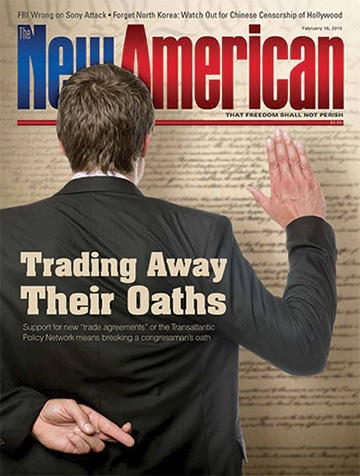Forget North Korea: Watch Out for Chinese Censorship of Hollywood
Pudgy and profligate little Kim Jong-un must be swelling with pride. With the FBI now concluding that North Korea was responsible for the recent computer hacking of Sony Corporation, it appears that Kim has succeeded in projecting power beyond his borders in, essentially, censoring a Western film. That work, of course, is The Interview, the Columbia Pictures action comedy portraying the rotund dictator in a negative light.
Many have castigated Sony — Columbia’s parent company — for capitulation. Pundit Linda Chavez likened the behemoth’s folding to Barack Obama’s normalization of relations with Cuba, writing that the two of them “are on the same page when it comes to appeasing dictators.” Political maven Newt Gingrich tweeted, “With the Sony collapse America has lost its first cyberwar. This is a very [sic] very dangerous precedent.” And both may be correct. Nonetheless, there is something certainly not unprecedented: Hollywood’s appeasement of dictatorial regimes.
Most movie-goers don’t know it, but many of the films on which they spend American dollars have been filtered by Chinese censors — by Beijing’s powerful State Administration of Radio, Film and Television (SARFT), to be precise.
That’s the stick. The carrot is China’s lucrative market, now the world’s biggest after recently ousting the United States from the number-one spot. And together they amount to economic blackmail.
How effective is it? Well, ironic given current events, did it ever strike you as odd that the invaders in the 2012 remake of the 1984 film Red Dawn were from small, third-rate power North Korea and not, oh, let’s say, from what could be the next evil empire, China? It should.
Because when Red Dawn was originally shot, the invaders were Chinese.
The studio creating the film, MGM, digitally altered the movie in 2011 to make them appear as North Koreans.
As you might imagine, this goose-stepping to Beijing’s tune is common now. As the Los Angeles Times wrote in 2012:
Chinese bad guys are vanishing — literally. Western studios are increasingly inclined to excise potentially negative references to China in the hope that the films can pass muster with Chinese censors and land one of several dozen coveted annual revenue-sharing import quota slots in Chinese cinemas.
... When Sony's "Men in Black 3" was released in China last month, censors had the studio remove or shorten several scenes set in New York's Chinatown that they believed depicted Chinese Americans unflatteringly.
... "Hollywood these days is sometimes better at carrying water for the Chinese than the Chinese themselves," said Stanley Rosen, director of the East Asian Studies Center at USC and an expert on film and media. "We are doing all the heavy lifting for them."
A screenwriter on another Hollywood tentpole was told by the studio to steer clear of any Chinese villains in shaping his script.
... "It's a clear-cut case — maybe the first I can think of in the history of Hollywood — where a foreign country's censorship board deeply affects what we produce," said a leading Hollywood producer....
Oh, and don’t ask that producer’s name — or that of many others interviewed for the L.A. Times story. They’d only speak under the condition of anonymity.
They were afraid of offending Chinese business interests.
And Chinese good guys are appearing to take the bad guys’ places. For instance, while Sony’s Columbia Pictures is now caving to the North Koreans, it had already kowtowed to the Chinese: In its disaster film 2012, it was by design that the White House chief of staff sang the Chinese's praises, lauding them as visionaries. Then there was British picture Salmon Fishing in the Yemen; while it portrayed Chinese engineers flexing their technological muscle, the book on which the movie was based had no such characters.
Some also might have noticed the increasing number of references in today’s films to the “Middle Kingdom.” A translation of the Mandarin word Zhongguo, a Chinese name for China, the term’s inclusion is no accident: It’s a way of advancing Chinese culture.
While much of this Hollywood China Syndrome is driven by the natural desire to cultivate business interests and please markets, government censorship may be the major factor. As the New York Times wrote last year:
The lure of access to China’s fast-growing film market…is entangling studios and moviemakers with the state censors of a country in which American notions of free expression simply do not apply.
... Hollywood as a whole is shifting toward China-friendly fantasies that will fit comfortably within a revised quota system.”
... At the same time, it is avoiding subject matter and situations that are likely to cause conflict with the roughly three dozen members of a censorship board run by China’s powerful State Administration of Radio, Film and Television, or S.A.R.F.T.
... [S]ome studios are quietly asking Chinese officials for assurance that planned films, even when they do not have a Chinese theme, will have no major censorship problems.
And Chinese involvement is quite invasive. A handful of examples follows (all quotations are the New York Times’s):
• A 3-D version of Top Gun was rejected by Chinese censors in 2012 because it portrayed “American fighter pilots in dogfights with MIGs.”
• Iron Man 3, partially filmed in Beijing, “proceeded under the watchful eye of Chinese bureaucrats, who were invited to the set and asked to advise on creative decisions.”
• The script of The Mummy: Tomb of the Dragon Emperor, filmed throughout China in 2007, “was preapproved by China’s censorship board. …[T]he emperor’s name had to be fictionalized, for instance,” and the “censors also cautioned that the ancient ruler should not resemble Mao Zedong.”
• “Co-productions like ‘Kung Fu Panda 3’ draw close monitoring by the censors at every step. Scripts are submitted in advance. Representatives of S.A.R.F.T. ... may be present on the set to guard against any deviation. And there is an unofficial expectation that the government’s approved version of the film will be seen both in China and elsewhere.”
Other movies touched by Chinese censors include, but are not limited to, 2007’s Pirates of the Caribbean: At World's End, the 2010 remake of The Karate Kid, 2011’s The Muppets, and 2012’s Life of Pi.
And while two versions of some films are created — one geared for China and the other for everyone else — more and more movies evidence “Middle Kingdom” manipulation. As the L.A. Times put it, “The net effect is a situation that movie-business veterans say is unprecedented: The suppressive tendencies of a foreign nation are altering what is seen not just in one country but around the world.”
This is troublesome to many observers, such as USC’s Professor Rosen. Just as Muslim chauvinists have succeeded in infusing American textbooks and schools in various countries with Islamic propaganda, he worries that a generation weaned on SARFT-sifted fare will have a sanitized conception of China, whose despotic regime is notorious for its human-rights abuses.
Some might say pandering to China and Kim Jong-un is much as if WWII-era filmmakers had scuttled Charlie Chaplin’s The Great Dictator or the Three Stooges parody You Nazty Spy!, both released in 1940, in deference to Adolf Hitler. But the reality is that what “movie-business veterans say is unprecedented” isn’t at all. Hollywood did work with Hitler. As the Hollywood Reporter wrote last year, when German officials “objected to scenes or dialogue they thought made Germany look bad, criticized the Nazis or dwelled on the mistreatment of Jews, the studios would accommodate them — and make cuts in the American versions as well as those shown elsewhere in the world.”
Commenting on Sony’s cancellation of The Interview's Christmas release, National Review wrote on Wednesday, “How grotesque it is ... to see businesses in the United States reacting so cravenly to what appears to be little more than a glorified letter of complaint.... [I]f the friends of a campy two-bit dictatorship can force us to put our tails between our legs and ask not to be thrown into the briar patch — then one can only wonder how we might expect to stand up to our more competent foes.”
We don’t have to wonder, at least insofar as Hollywood goes. The people who preach about all the nouveau “morality” and its bugaboos — tolerance, multiculturalism, “sexism,” “racism,” and “homophobia” — tipped their hand in the 1930s.
And they tipped it again in recent times — long before the litle stunt now being attributed to Lil’ Kim Jong-un. Because while all eyes are currently fixed on the North Koreans, our movies' real Red Dawn invaders are Middle Kingdom meddlers who make changes without making headlines.


